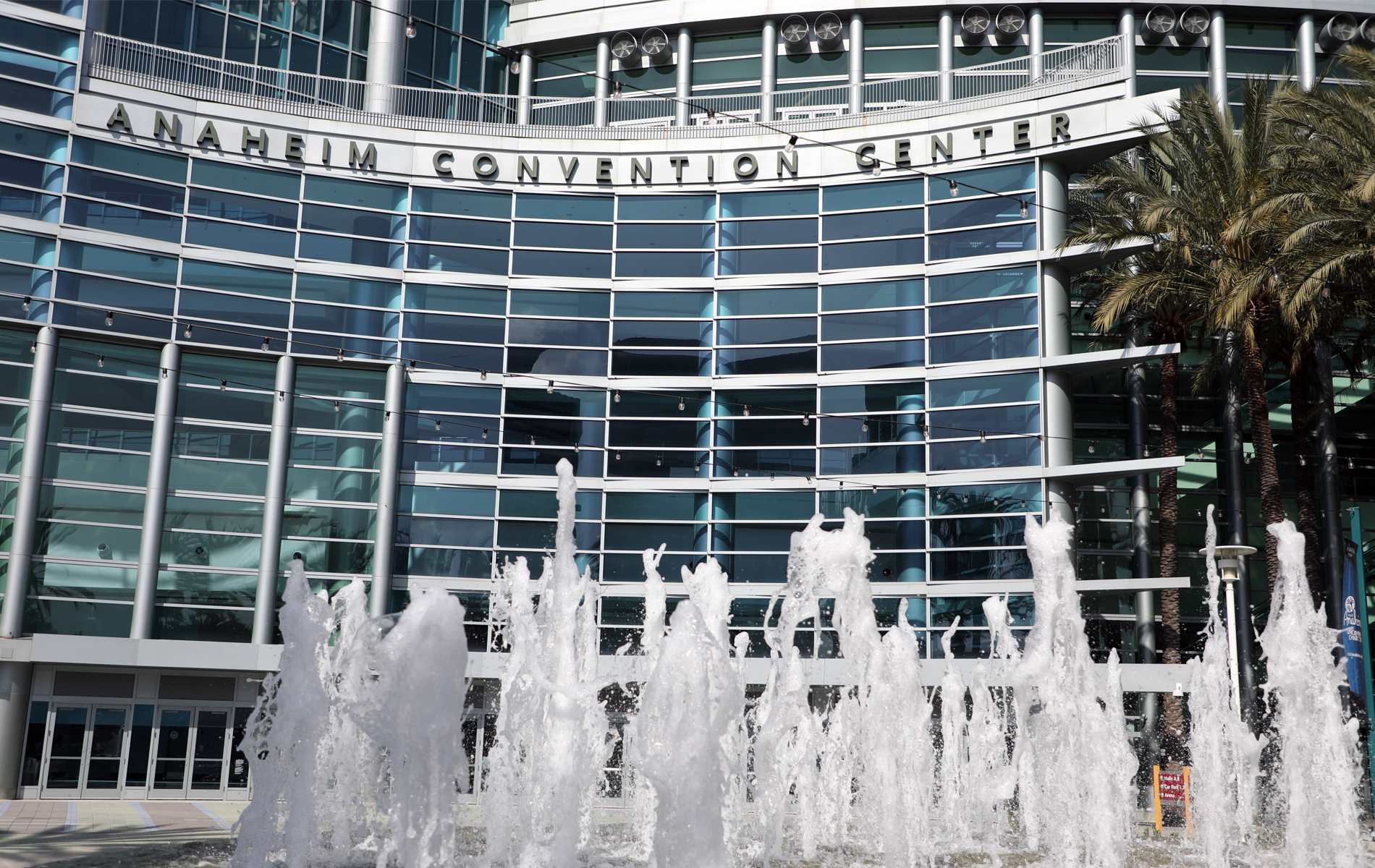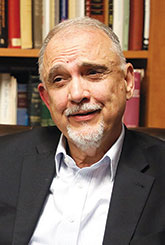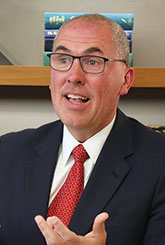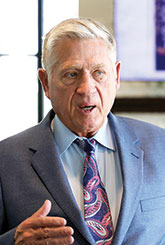Editor’s Note: The three known candidates for president of the Southern Baptist Convention when it meets in June in Anaheim were each interviewed by Baptist Press in early May. A condensed version of the interviews with Tom Ascol, Bart Barber, and Robin Hadaway are presented here with brief introductory remarks, but links to their full interviews are provided.
Tom Ascol
For more than 30 years, Tom Ascol (https://www.baptistpress.com/resource-library/news/an-interview-with-tom-ascol/) has been known as a leader with deep theological convictions through his work at Grace Baptist Church and Founders Ministries, Cape Coral, Fla. While Ascol, 65, has never held an office as a trustee or board member of the SBC, he has been an influencer, and his name is well-known in Southern Baptist life.
Over the last few years, debates over issues such as Critical Race Theory, the work of the Ethics & Religious Liberty Commission, and claims of liberal drift have permeated the SBC. Ascol’s voice has been prominent — sometimes preeminent — in every discussion.
Why are you willing to be nominated to be president of the SBC?
I’ve never aspired to it. But over the last two or three years, requests have been more serious. People have actually sat down and talked to me and made arguments that became increasingly convincing. I’ve wanted to see things done differently in our SBC the last several years and have been pretty vocal about that.
So, I talked to my wife, and she was surprisingly open to it. With my wife’s willingness and the elders saying, “Yeah, we think this is a right thing,” I said, “OK, I’m willing.”
Talk a little about the importance of regenerate church membership and how it has impacted Founders Ministries.
Our forefathers paid a high price for our convictions, and we say we believe the church is to be made up only of those who give credible profession or are regenerate. The idea that the church ought to be a pure church doesn’t mean there’s no sin, no false believers, but the false believers are the exception.
If you use just the bare minimum metrics of church attendance (which doesn’t prove you’re a Christian), we’ll have a membership that’s two or three times what the regular average attendance is. It shouldn’t be that way if our membership is made up primarily of born-again people.
Your church uses the Second London Baptist Confession of 1689 and the New Hampshire Confession of 1853. What are your thoughts about the Baptist Faith and Message?
I think it’s good. It’s generic, so I believe a lot more than the Baptist Faith and Message. I think the Baptist Faith and Message just leaves some gaps we could clear up.
What is the role of women in leadership at Grace Baptist Church?
We’ve had women teach high school and junior high classes. It’s a husband-and-wife team teaching. We don’t have any women here that aspire to be pastors or aspire to preach to men and women mixed. We read what the Bible and Paul meant when he said that a woman’s not to teach or exercise authority over men, and we don’t do that.
What’s your view on women in leadership in convention roles?
A denomination is not a local church, but the idea of male and female distinctions doesn’t end at the local church or the family either.
I don’t think I would be asking any women to be a chair [of a committee].
What does it mean to be Southern Baptist?
A Southern Baptist church is a church that has agreed voluntarily to unite with other churches for common causes: benevolence, missions, and evangelism. That has spread through the years to theological education, disaster relief and social concerns.
What are some of the local and state partnerships that stick out to you?
We’ve been involved in immigrant ministry here in Florida. We’ve worked with disaster relief. We’ve worked in theological education. Obviously, I went to Southwestern and was able to do that far less expensively than I would have otherwise. We’ve also sent missionaries through the IMB.
While you say Critical Race Theory shouldn’t be prescribed, should it be taught in SBC seminaries?
I say teach it the same way you teach evolution or higher criticism or something. But is Critical Race Theory a helpful analytical tool the way that Critical Race Theory says it ought to be used? Absolutely not. It’s incompatible with the gospel.
Is racial reconciliation something that should still be pursued by the SBC? If so, what should that look like?
Yes, absolutely, but it should be pursued on the basis of what the Word says. You don’t make two different standards or two different entry ways or various entry ways for different races or ethnicities. You bring the gospel front and center.
How would you change the direction in the SBC?
We need to rekindle a fear of God. I just think God is treated kind of lightly by us today. When I listen to the way some professing Christians talk and what they’re advocating, I’m wondering if we are even practicing the same religion.
How would you lead through the response to the report of the Sexual Abuse Task Force?
I praise God that we have focused attention on this, but my fear is that we’re going to be taking our cues from culture.
What do you see as your most important responsibilities as SBC president?
I would say trying to build bridges between these disparate groups we have in the SBC right now.
Bart Barber
Whether it’s from a video posted on social media or a microphone at the SBC annual meeting, you don’t have to listen to Bart Barber (https://www.baptistpress.com/resource-library/news/an-interview-with-bart-barber/) long before you know he cares about Southern Baptist polity. Barber, senior pastor of FBC Farmersville, Texas, is scheduled to be nominated for SBC president by Matt Henslee at the 2022 SBC annual meeting in Anaheim. Barber, 52, has served in a number of roles beyond pastor in the SBC. He’s the chairman of the 2022 SBC Resolutions Committee and was a member of the 2021 committee. He also preached at the SBC Pastors Conference in 2017, served as first vice president of the SBC from 2013 through 2014, and also served on the Southern Baptists of Texas Convention executive board, as a trustee for Southwestern Baptist Theological Seminary, and on the SBC Committee on Committees.
Why are you willing to be nominated to be the president of the Southern Baptist Convention?
In prayer, I believed that God was calling me to do this.
What are some things the local church must get right?
I’m committed to congregational church governance. Church members ought to have to think about what the mission of the church is.
How is your church making an evangelistic impact?
We baptize 14 to 17 people pretty consistently every year. I’d love to see that be more every year. We’re proclaiming the gospel, and we’re winning people to Christ. We’re making disciples.
We see so much division among Southern Baptists on social media. How would you pull them together and move forward?
I think one of the first things that we’ve got to do is develop some sort of a reasonable standard that has to be met for an accusation to be taken seriously.
Do I know every detail about how to bring everybody together? I don’t think I have the plan in place yet that solves all of that. The fruit of the Spirit and the work of Jesus in people’s hearts would go a long, long way. But a starting place would be to have an agreed-upon standard.
What does cooperation look like in the age of social media?
We have a statement of faith. Cooperation has to have boundaries. I’m not opposed to drawing lines. I’m not opposed to being on guard against liberal drift. But cooperation means being able to draw some lines and say, “That’s good enough,” and to allow some difference of opinion.
If I were drawing up a statement of faith, just for me, it would be stricter than the Baptist Faith and Message because it would line up with just my beliefs, but cooperation means everybody looking and saying, “OK, I could say more by myself and my church may say more by ourselves, but this is what we could say together that we believe.”
Is there a liberal drift in the SBC?
I think there’s not evidence of a systemic liberal drift of the severity and nature that some people say, but we’ve had individual churches and people within the Southern Baptist Convention who moved to LGBTQ-affirming positions. We’ve had churches within the convention who have wound up leaving because they’ve moved to those liberal positions on those questions. That’s liberal drift, but it’s liberal drift that leaves because it can’t succeed here.
There’s been a lot of discussion about possible remote voting changes in the constitution. Where do you stand on that?
I’m opposed to remote voting for this reason. We live in a time where technology is advanced and makes a lot of things possible. We also live in the time of technology failures, and the level of division that would ensue — and the accusations of elitism and the conspiracy theories that would ensue — if we had technological problems pop up in the middle of an important vote for the Southern Baptist Convention (it) would be horrible.
The next president will lead us through the report of the Sexual Abuse Task Force. Are you prepared for that?
I have a long-term demonstrated track record of being all in on Baptist polity and Baptist distinctives and Baptist beliefs.
Talk a little bit about your view on the role of women in pastoral leadership in the local church.
I believe that the office of pastor is limited to men, as qualified by Scripture. I’m a comparatively strict complementarian. Everybody teaching a mixed Sunday school class in our church is male. We don’t have women preach. So, it’s not just the office for us. There’s also some functional restriction for us.
Are there other roads that we need to be traveling when it comes to dealing with racial reconciliation?
Critical Race Theory is, at its foundation, a theory about the law that comes out of law schools and the legal community. Critical Race Theory is perfectly willing to dispense with what are some Judeo-Christian ideas about what fairness and justice look like, that I believe are biblical.
Ultimately, racial reconciliation is reconciliation. It’s about doing that same thing we do in our local churches, looking to see who needs to be pulled in closer and being intentionally kind and welcoming and also recruiting to bring people into positions of influence.
What are some of the most important assignments of the SBC president?
I would think all of it can be fit under three headings: to protect the rights of the messengers, to answer the messengers’ questions, and to execute the messengers’ instructions.
What makes you happy to be Southern Baptist?
These are the people who’ve loved me all my life. It’s a great family of people and churches.
If I left the Southern Baptist Convention, I’d have to try to recreate it because it’s a joyful place to be.
Robin Hadaway
Though he’s a busy senior professor of missions at Midwestern Baptist Theological Seminary, Robin Hadaway (https://www.baptistpress.com/resource-library/news/an-interview-with-robin-hadaway/) will be somewhat of a hometown presidential candidate when the SBC annual meeting takes place in Anaheim this summer. Hadaway and his wife, Kathy, live in nearby Oceanside, Calif., where he pastored before they became International Mission Board missionaries.
He’s been committed to the mission for his entire ministry career, serving for 18 years as an IMB missionary, 18 years at Midwestern Seminary, and six years as a pastor of a local church. Hadaway, 73, is calling for the planting of 500 new churches in North America, 2,000 new church plants overseas, and a new emphasis on chapters of the Woman’s Missionary Union in churches.
Why are you willing to be nominated to be president of the SBC?
I have had the honor and privilege of working for the denomination for 36 years, 18 as an IMB missionary and 18 as a seminary professor and counting. Now I’m a senior professor. I did pastor for six years and was very involved in the Conservative Resurgence.
I just felt that we needed to focus on the mission. Not that we haven’t been focusing on the mission, but I just wanted to call out the called.
I believe strongly in a missionary call. I’d like to see 500 new church plants in North America and 2,000 overseas. And I’d like to see a re-emphasis on the Woman’s Missionary Union.
Would you say the message of the SBC has drifted in more of a political direction over the past few years?
Yes. And I think that’s reluctantly. It is just something that happens because of social media. I think we tend to focus on the cultural issue of our day rather than what might be a biblical cultural issue.
Do you believe the next generation is coming back to a focus on missions?
I didn’t really think I wanted to teach college students because I was happy teaching master’s and doctoral students, but the college students became my favorites because you get these 18-year-olds, and they’re so excited. Well, I think they’re excited to be away from home for one thing, but they’re also excited to just be studying and they’re out witnessing. I must say people talk about millennials — my students, master’s and [bachelor’s] — I am very encouraged with their mission-mindedness. I really am.
What are a few things every church must get right?
A focus on missions and evangelism.
What does it mean to be Southern Baptist?
I read the preamble of the Baptist Faith and Message. It says that the churches are voluntarily joining together for missions, educational, and benevolent causes. Those are the three purposes of the SBC.
What is the role of women in the local church?
I am firmly complementarian. I believe women have an important role in the local church. Most Southern Baptist churches have committees, so that means Southern Baptists see that women can have roles as committee members.
Do you believe there is an elite group of leaders running the SBC?
My short answer is no. I don’t believe the so-called elites see themselves as elites. I really don’t. They’re just trying to pastor their churches.
Do you believe racial reconciliation needs to be addressed in the SBC?
In Africa, I was always treated with respect. When I was in Africa, I decided I’m going to treat these guys the same way I would treat all my friends. I would eat out of a common bowl with them. I would share my water bottle with my African friends. I would say the finest believers on the planet are the ones that I served with in North Africa.
Race is not a biblical word. Ethno is the biblical word (ethnicity). As we know, there’s only one race, the human race, but there are different people and tribes.
What are the most important assignments in the role of the SBC president?
I would say, just because of the history of the Conservative Resurgence, (it) is to appoint the Committee on Committees.
The SBC president represents Southern Baptists to the secular world and also to the Southern Baptist world. Southern Baptist presidents visit disaster sites. I think that’s an important pastoral role. You kind of serve as the pastor of the convention, with all that entails.
The SBC president is typically a pastor, but you aren’t right now. How does that make you unique for this role?
Having pastored churches, I understand the SBC, and that’s why I feel like I can pastor it.
What makes you happy to be a Southern Baptist?
I would say what makes me most joyful is that we send missionaries. They’re able to do their work without worrying about losing their support.
You’ve been around the SBC for about 45 years. Where do you think it needs to go in the next 50 years?
Every generation has to contextualize the gospel for their generation. The gospel never changes, but the culture does.
Is there anything else you’d like to share?
I’m not part of any group. I don’t think anyone can accuse me of having an agenda. My agenda is just to focus on missions. I think the convention is a bit tired right now. They need some refreshment and joy. And so I hope to bring that.



